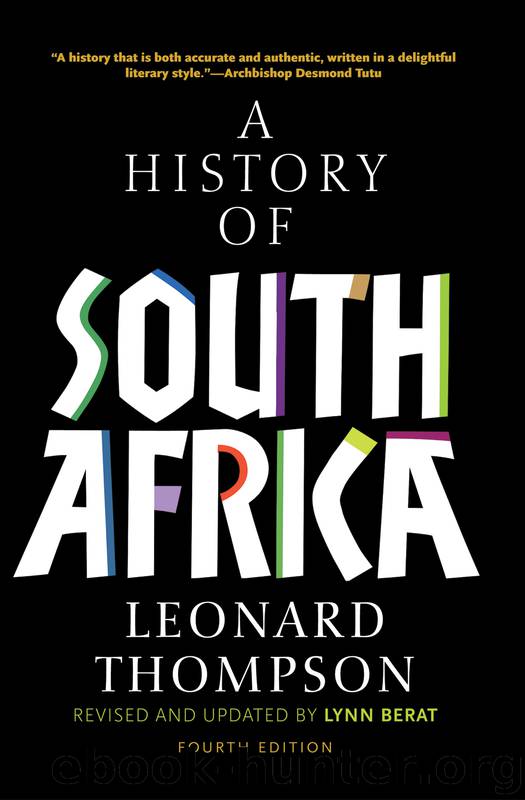A History of South Africa by Leonard Thompson

Author:Leonard Thompson
Language: eng
Format: epub
Publisher: Yale University Press
Published: 2014-10-15T16:00:00+00:00
South Africa in the World
The postwar world was quite a different place from the imperialist world of the 1930s. While apartheid was taking root in South Africa, political power was flowing in the opposite direction in the rest of Africa.66 In 1957, following the decolonization of its Asian territories, Britain transferred power to African nationalists in the Gold Coast (Ghana), soon to be followed by the other British territories in West Africa—Sierra Leone, Nigeria, and the Gambia. In i960, the French relinquished political control over their two federations of colonies in west and central Africa, and the Belgians withdrew from the Congo (Zaire), their vast territory in central Africa.
By that time, African nationalism had swept eastward and southward into the British territories where there were significant pockets of white settlers. Early in i960, Prime Minister Harold Macmillan of Britain toured tropical Africa and then visited South Africa. On February 3, in the Parliament in Cape Town, he spoke of “the wind of change” that was sweeping over the continent and made it clear that Britain would not support South Africa if it tried to resist African nationalism. Over the next four years, the British transferred power to local nationalist parties in Tanganyika (Tanzania), Uganda, Kenya, Malawi, and Northern Rhodesia (Zambia). In 1965, the white settler government of Rhodesia postponed a similar outcome by asserting sovereignty over the colony and making a unilateral declaration of independence. No country recognized Rhodesian independence, however, and local Africans resorted to guerrilla warfare against the regime.67 Between 1966 and 1968 Britain transferred power to Africans in three other neighbors of South Africa—Basutoland (Lesotho), Bechuanaland Protectorate (Botswana), and Swaziland. Successive governments in Pretoria had tried to persuade London to allow South Africa to incorporate those three territories, as had been envisaged by the South Africa Act of 1909. But after 1961, when South Africa became a republic and left the Commonwealth, incorporation was no Jonger possible.68
African nationalism continued to transform the Southern African region. In 1974, African resistance to Portuguese colonialism led to a coup in Lisbon, and the following year Angola and Mozambique gained independence.69 By 1978, the white settler regime in Rhodesia was barely surviving a fierce civil war and international sanctions, and South Africa was controlling Namibia only by defying the United Nations.
The United Nations differed from its predecessor, the League of Nations. Whereas the European powers had dominated the League of Nations, which the United States never joined, the Soviet Union and China, as well as France, Britain, and the United States, had permanent seats and vetoes in the U.N. Security Council, and other countries, including third world countries, served in turn on the Security Council and formed a majority in the General Assembly.70 From 1952 onward, the General Assembly passed annual resolutions condemning apartheid. Then, as the number of independent Asian and African states increased, each with a seat in the General Assembly, the United Nations devoted more and more attention to racism in South Africa. By 1967, the General Assembly
Download
This site does not store any files on its server. We only index and link to content provided by other sites. Please contact the content providers to delete copyright contents if any and email us, we'll remove relevant links or contents immediately.
| Central Africa | East Africa |
| North Africa | Southern Africa |
| West Africa | Algeria |
| Egypt | Ethiopia |
| Kenya | Nigeria |
| South Africa | Sudan |
| Zimbabwe |
Goodbye Paradise(3809)
Men at Arms by Terry Pratchett(2836)
Tobruk by Peter Fitzsimons(2516)
Borders by unknow(2313)
Arabs by Eugene Rogan(2299)
Pirate Alley by Terry McKnight(2221)
More Than Words (Sweet Lady Kisses) by Helen West(1867)
Belonging by Unknown(1855)
It's Our Turn to Eat by Michela Wrong(1730)
The Biafra Story by Frederick Forsyth(1656)
The Source by James A. Michener(1613)
Botswana--Culture Smart! by Michael Main(1601)
Coffee: From Bean to Barista by Robert W. Thurston(1544)
A Winter in Arabia by Freya Stark(1538)
Gandhi by Ramachandra Guha(1531)
The Falls by Unknown(1524)
Livingstone by Tim Jeal(1489)
The Shield and The Sword by Ernle Bradford(1409)
Africa: Altered States, Ordinary Miracles by Richard Dowden(1384)
